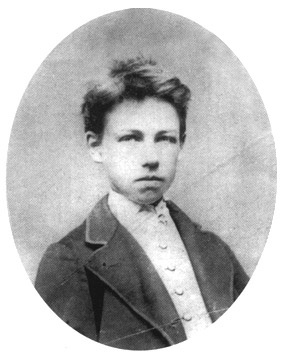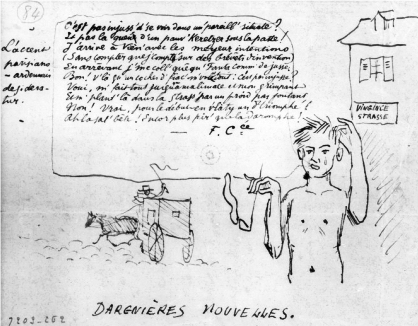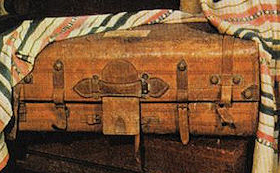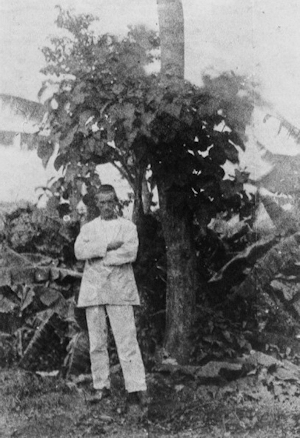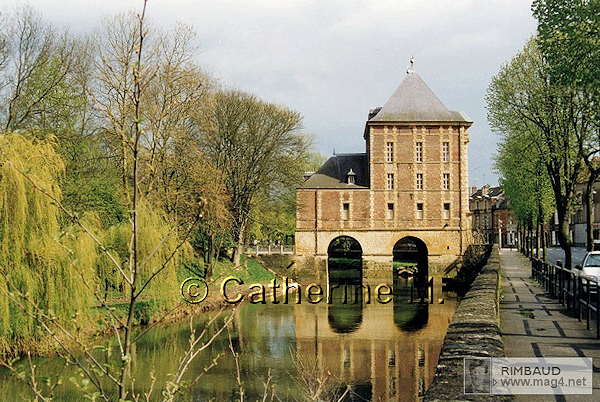Arthur Rimbaud in September-October 1871 2nd photograph by Etienne Carjat |
"This Considerable Passer-By"
...................... "He, brilliance of a meteor, lit up with no other motive than his presence, born by himself then dying out". "... the one who rejects dreams, by his fault or theirs, and operates on himself, alive, for poetry, later can find only far, very far, a new state. Oblivion includes the space of the desert or the sea." Stéphane Mallarmé: letter to M. Harrison, Rhodes. "Arthur Rimbaud", The Chap Book Review,
15th May, 1895 and Divagations, 1897
...................... |
|
On 13th February, 1875, he left for Stuttgart, as a tutor, after having studied German for a few weeks. On 2nd March, he was joined there by Verlaine. Paul had just come out of prison and was in a full crisis of religious exaltation. "Verlaine arrived here the other day, a rosary in the claws" he wrote to Delahaye on 5th March. "Three hours after, we had renounced his god and bled the 98 wounds of Our Lord. He remained two days and half extremely reasonable and on my remonstration went back to Paris". Rimbaud gave the manuscript of the Illuminations to him to have it published. They would never see each other again. As Arthur was short of money, he asked for Verlaine's financial help in a letter. But Paul refused, so Arthur sent him another letter full of insults. Yet Verlaine went on to be interested in what would happen to his friend, sending letters to him and getting no answers. He went on to get some news by Delahaye or Nouveau, their mutual friends. At the beginning of May, Arthur left Stuttgart on foot for Italy. Exhausted and sick, he spent one month in Milan at a widow's house, and set off towards the South again in June. Falling ill of a touch of heat-stroke, he was repatriated in Marseilles by the French Consul in Leghorn. From there, he went back to Paris, where he worked as a tutor, then returned to Charleville at the beginning of October. He spent winter to study languages, in particular Russian and Arabic, then had a passion for music and piano. On 18th December, his favourite sister Vitalie died of a tuberculous synovitis. Deeply affected, he shaved his head as a sign of mourning. On Spring 1876, he set out again for Vienna and had hardly arrived, he was stripped by a coach driver. Without a penny, he was escorted back to the frontier by the police and returned on foot to Charleville.
Last News. Rimbaud stripped in Wien, drawing by Paul Verlaine.
Collection Rimbaud's Museum, Charleville In May, he crossed Belgium and enlisted in the colonial Dutch army.
He arrived in Batavia, deserted three weeks later and went back to Europe on a Scottish ship.
Back to Charleville in December, he spent winter there, then set out again towards the North: Cologne, Bremen. He was found working as an
interpreter in a circus on tour in Denmark and Norway. He tried to join the American Navy. In 1878, he was seen in Paris for Easter, then helped his family to work in the farm
during the summer.
In the Autumn of 1879, he made another false start. In Marseilles, feverish, he turned back to Roche. Delahaye who visited him, told: In March 1880, he went back to Cyprus where he supervised the construction of the
governor's residence. Then he worked as a foreman in another stone quarry. During ten years, he moved on between Aden and Harer, made trade, crossed the country on foot, horse, alone or with caravans. He spoke Arabic and learned the local languages. He merged into the population.
|
|
He found Aden dreadful, "it is a rock without a single blade of grass or a drop of good water": they drank distilled sea water. The heat was excessive there and all was very expensive. On the other hand, he was feeling much better in Harer where there was more air and greenery. Isolated, he took up with his family again, his only ties in Europe. The most part of his letters were addressed to his mother and sister. He entrusted them part of his savings. He had plans: new trading posts, expeditions, to write a work on Harer or the Gallas country. He ordered a camera. He red many technical works and took an interest in the Koran. |
Rimbaud's trunk
|
"This is only to remind you of my face
and to give you an idea of the landscapes from here" |
But he was bored: "[...] For me, I regret not being married and having a family. But now I am condemned to wander, attached to a faraway company, and every day I lose the taste for the climate and the manners of living, and even the language of Europe. Alas! What is the use of these comings and goings, and these tiredness and these adventures among strange races, and these languages of which the memory is filled, and these troubles without name, if I must not a day, after some years, be able to rest in a place that I like more or less, and find a family, and have at least a son that I spend the rest of my life to raise with my own idea, to enrich and to arm of the more complete possible instruction that can be reached at that time, and that I see become a famous engineer, a man powerful and rich by the science? But who knows how long can last my days in these mountains? And I could disappear in the middle of these tribes, without the news never coming out of it [...]" (Letter to his family, 6th May, 1883) In February 1884, The Society of Geography published in its bulletin the report written by Rimbaud for Alfred Bardey on the Ogaden country where he had organised several expeditions. The company which employed him having gone bankrupt, he closed Harer agency and returned to Aden in April 1884. He was accompanied by an Abyssinian girl and lived with her for two years. Then he left Bardey's agency and engaged in arms dealing, by delivering rifles to Menilek, King of Showa, in war against Emperor Jean of Abyssinia. This adventure mobilised him from October 1885 to July 1887, and proved to be disastrous. His partners Pierre Labatut and Paul Soleillet died. The first one from a cancer of the throat, the second from a stroke in a street of Aden. So he left alone with the caravan. The delivery having arrived too late, he was obliged to sell off the prices and to pay Labatut's debts. |
|
During this time, in Paris, people started to speak about him. Verlaine published the Accursed Poets, with a chapter about the Man with the foot soles of wind, and at the beginning of summer 1886, the Illuminations appeared in the review the Vogue. At the end of July 1887, he went to Cairo with Djami Wadaï, his young servant, to take
some rest a few weeks. A daily newspaper from there, the "Egyptian Bosphore", published the notes he wrote during his expedition in Showa.
On 8th October, he was back to Aden. In March 1888, he set up a new trade agency in Harer in partnership with César
Tian, a trader of Aden. He became storekeeper, sold hardwares, bartered and was always bored. His best friend was
Alfred Ilg, Swiss engineer, who became Menelik's Prime Minister. In France, articles appeared about him, poems were published, he began to be well-known and to arouse curiosity. Arthur learned it by a letter he received from an old classmate, Paul Bourde. He kept it preciously. According to people who have known him in Africa, he was a taciturn, withdrawn, unsociable man with a dry sense of humour. Honest, scrupulous, methodical trader and accountant, demanding a lot from others and from himself too, having a very simple life, almost ascetic, liking to make good around him by helping the poor, but of an inconstant nature, irritable, grumpy and moaning on his bad days. In February 1891, a pain with the right knee started to prevent him from walking. The state of his leg got worse, he closed the agency. Having a stretcher made, covered with canvas, he was carried by men to cross the 300 kilometres of desert to the port of Zeïlah and the journey was a real torture. In Aden, the doctor of the European hospital diagnosed synovitis to a so advanced stage that amputation was necessary. Because of the exhausted, overworked and underfed state of Arthur, synovitis quickly developed into a cancerous tumour (carcinoma). Hereditarily, it was also the weakness of all the children Rimbaud as Vitalie, Arthur's younger sister, died of a synovitis complicated with tuberculosis and Isabelle would die of a similar disease in 1922. Arthur found the strength to liquidate his business, and on 9th May, took the boat
for France. On 27th May, he had his right leg amputated at the Conception
hospital in Marseilles. His mother joined him then set out again. Arthur was in despair because of her too sudden departure and did not forgive her. |
|
On 23rd July, he went back to Roche in a special carriage, looked after
by his sister Isabelle.
One month later, he set off with her to Marseilles again, thinking of being better treated over there. At his arrival to the station, he was taken to hospital. Cancer was general.
His state was becoming worse, he started to be delirious and scared, asked for going back to Harer, and for his young servant Djami who stayed there. "[...] But to always live at the same place, I will always find that very unfortunate. Finally, the most probable is that we rather go where we don't want to, and that we rather do what we would not like to do, and that we live and die quite differently than we would not ever like it, without hope of any sort of compensation [...]" (Letter to his family, 15th January, 1885) |
|
|
Isabelle decided to restore his brother's good name,
and told that he died like a good Christian. Respecting his last wishes, she paid the legacy of 750
thalaris to Djami. As he was also dead, probably during the famine in Harer, the settlement went to his heirs. There are uncertainties regarding some parts of the poems as they were written
most of the time on loose sheets, except the leafs entrusted to Demeny, where Arthur had written up his first poems when he was
in Douai, in October 1870.
- *A ribaud is a debauched person. Biography and translation by Catherine for mag4.net, revised by Claire Arnold, Marcie Soliz and John Evans. All Rights Reserved. Please refer to the terms of use. Page 1 | Page 2 |
